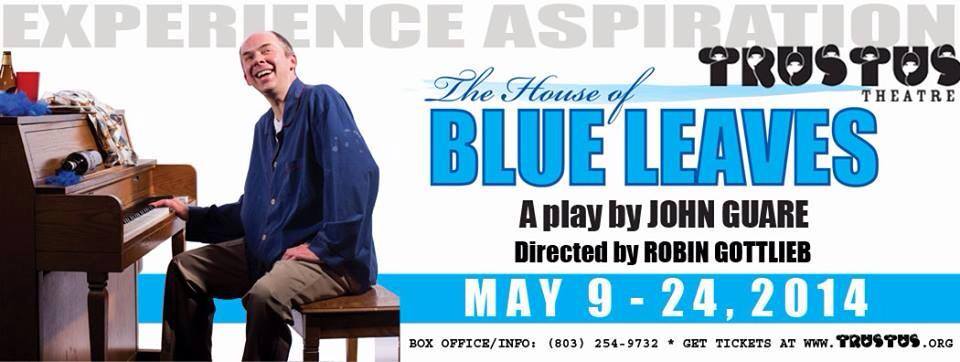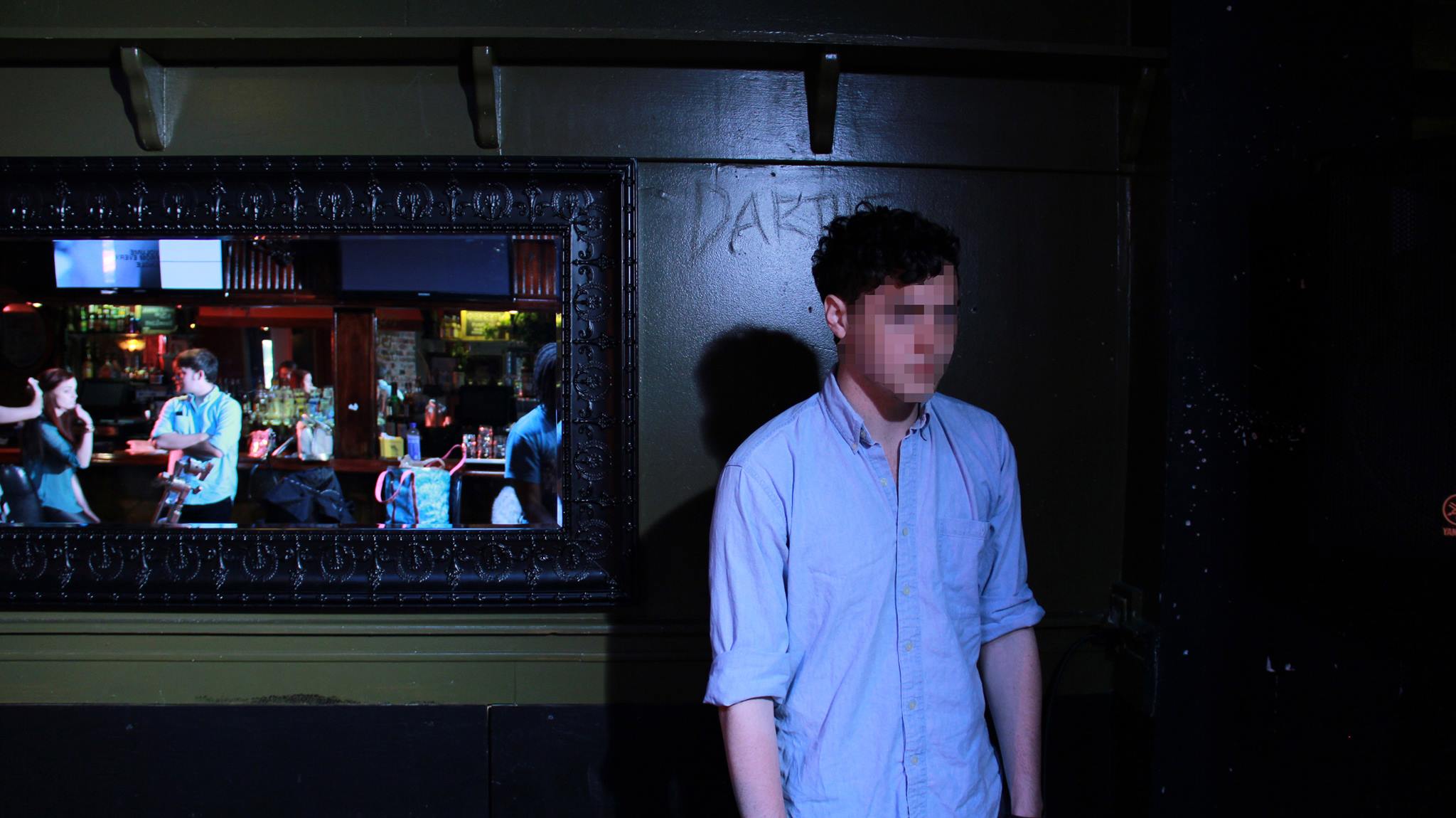 There's a speech at the beginning of the second act of The House of Blue Leaves, the new show at Trustus Theatre, delivered by Philip Alexander as the son in the story's central family. Speaking directly to the audience, he details a missed opportunity for stardom; as a child, he had the chance to be cast as Huck Finn in a Hollywood film, and so naturally he tried to impress the director by dancing, singing, and cavorting about with a child's typical joyous lack of inhibition. The director assumes he must have some emotional or developmental challenge, and the boy's ambitions, along with his ego, are crushed.
There's a speech at the beginning of the second act of The House of Blue Leaves, the new show at Trustus Theatre, delivered by Philip Alexander as the son in the story's central family. Speaking directly to the audience, he details a missed opportunity for stardom; as a child, he had the chance to be cast as Huck Finn in a Hollywood film, and so naturally he tried to impress the director by dancing, singing, and cavorting about with a child's typical joyous lack of inhibition. The director assumes he must have some emotional or developmental challenge, and the boy's ambitions, along with his ego, are crushed.
That's a fair representation of the themes addressed in the show. Ordinary people aspire to greater things, sometimes with great self-deception, while struggling with the emotional burdens they carry. Rarely do things work out as planned, although sometimes fate seems to give them a break - but only if they are paying attention. Scott Herr takes the lead role of Artie, a mild-mannered New York zoo employee who composes and performs songs, partly as a hobby (which he thinks is his passion) and partly to distract him from his home life. His wife, whom he called "Bananas," suffers from some form of mental illness, which is only getting worse. As Bananas, Monica Wyche drifts in and out of incoherence, sometimes passively crumpling into a ball, sometimes delivering rambling monologues that are occasionally quite poetic, and sometimes giving us glimpses of the well-adjusted wife and mother she must have once been.
The third principal character is Artie's new mistress Bunny, as loud and brassy a New Yorker as her name implies. Sumner Bender, normally a willowy, chic and sophisticated young actress, somehow manages to play a significantly older and frumpier character through mannerisms and line delivery alone, although costume design by Dianne Wilkins helps. Resembling a younger version of a Far Side lady, Bender dominates the stage whenever she appears, engaging in non-stop chatter. She's annoying, yet ultimately she grows on you, sort of like Snookie. Part of that appeal derives from her (seemingly) genuine desire to help Artie move on to a better place in his life. Unfortunately that involves placing Bananas in an institution, which Artie describes as surrounded by trees full of lovely bluebirds, creating the illusion of the title's blue leaves. All three performers employ every trick in the actor's handbook to create nuanced characters, and their accents, especially those of Bender and Alexander, are just perfect (if a little grating to the Southern ear.)
With that inter-personal backdrop, the play begins in 1965 as the Pope is visiting New York. Most of the characters are Irish Catholic, and see this as a potentially life-changing event. Artie's connection is vastly more important, as he not only hopes that he will somehow be blessed/forgiven/vindicated as he prepares to leave his wife, but also that the Pope will somehow convince the country to end the Viet Nam War, in which his recently-drafted son will otherwise soon be involved. The story I have just described seems quite realistic, but there is a pervasive tone of the Absurd (with a capital A, signifying the dramatic form) as events that technically could happen transpire, but become progressively surreal. Among the visitors to Artie's home in the second act are three nuns (Becky Hunter, Rachel Kuhnle, and Erin Huiett) Artie's childhood friend Billy, now a Hollywood bigshot (Bernie Lee), Billy's girlfriend (Kayla Cahill), and a couple of authority figures (Robert Michalski and Clark Wallace.) Everyone is perfectly cast, and Lee especially looks the part, with simple things like a turtleneck and facial hair instantly defining his character. Cahill in particular has some incredible moments where she's not saying a word, but her silence and pained expression speak volumes.
Then a lot of wild comedy breaks out, and there are some good laugh lines, as well as a lot of eloquent ones. Especially poignant is Herr's realization that "I'm too old to be a young talent." If at any time we lose track of a particular character's purpose or motivation, playwright John Guare incorporates a number of revealing and sometimes soul-baring monologues, spoken directly by the characters to the audience. Director Robin Gottlieb is a master of timing, and she has her actors working every possible detail of their roles, making unlikeable characters accessible to the audience. All of this is significantly enhanced by Heather Hawfield's wide, expansive set design. It's just a realistic interior of a shabby apartment in a big city, but she somehow manages to open the stage up, as if she's taking a dollhouse and unfolding it, allowing us to see every corner. I can think of a half dozen shows or more at Trustus that would have benefited from this type of staging.
As I have said previously, actors hate it when you review the material, not the performance. After all, they can't rewrite the script. So let me be clear: there is not a single flaw in acting or staging - everything is done quite proficiently and professionally, and I think everyone involved can be proud of their work on this show. That said... gentle reader, I just didn't get it. The play is a famous work from an important author; its original production won both the Obie and the Drama Critics' Circle Awards for Best Play, and subsequent revivals have garnered multiple Tony nominations and wins. Lots of famous people have appeared in versions of this show over the years. It's usually described as a comedy, or a dark comedy. There were certainly funny moments, and funny lines, but to me this was a serious drama that involved some witty characters and some surreal moments where you had to laugh. I'm told the audiences the night before and the afternoon after I saw the show were boisterous and laughing throughout the performance, whereas it was a much quieter house the night I attended. This may well be. And given the fame and reputation of both the work and its author, I'm inclined to think I just somehow missed something.
There is certainly a broader theme of hope vs. reality, and the perils of life's curveballs. At some level I'm sure Artie represents humanity, with Bunny as the voice that tells us "you can do it," even if we can't. Bananas is probably the hurt child within us, the never seen Pope is surely symbolic of the redeeming panacea we all wish for, while the naughty nuns can probably be seen as representations of the random chaos surrounding and affecting us all. But again, let me be clear - while there are some Absurdist moments, this is by and large a straightforward, realistic play with a linear plot. Possibly my tastes are changing as I get older, because parts of this play reminded me of Pinter's The Caretaker, Fugard's A Lesson from Aloes, even Beckett's Waiting for Godot, all difficult and challenging works which I enjoyed and admired as a young man. But for whatever reason, and no matter how well the cast delivered the author's well-chosen words, it never all came together for me in a way that I could understand, or benefit from some message or realization. So that probably means it's just me. There are only seven shows remaining, and I encourage anyone who wants to be challenged by thought-provoking drama to go see the show right away. I want to hear that you loved the comedy and were touched by the pathos, and I want you to tell me what I missed. And I want you to tell me if the ending is literal or metaphorical. Seriously - we have a "comments" section below that is almost never used. So have at it, and tell me how I completely missed the boat on this one. And either way, enjoy some great actors while sipping on a tasty adult beverage in a cool, intimate performance venue. The House of Blue Leaves runs through Saturday, May 24; call the box office at 803-254-9732 or visit www.trustus.org for ticket information.
~ August Krickel









